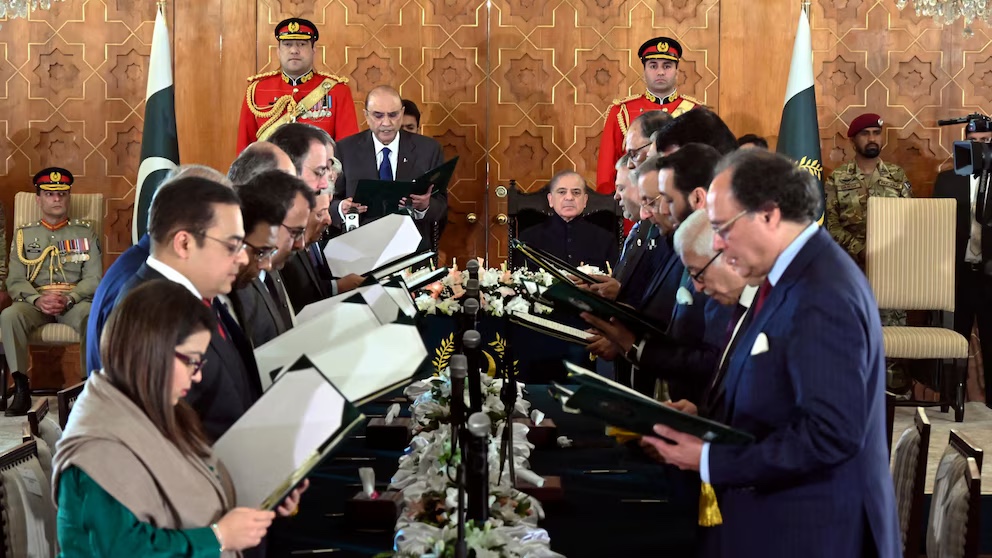Pakistan PM Shehbaz Sharif forms cabinet to tackle economic crisis

Pakistan’s Prime Minister, Shehbaz Sharif, unveiled his cabinet, charged with navigating the nation through a profound economic turmoil characterized by mounting debt, soaring inflation, and a weakening currency. The announcement follows a contentious election marred by allegations of electoral fraud. The newly appointed ministers, numbering 19, were sworn in on Monday.
Among the key appointments is Muhammad Aurangzeb, a seasoned figure in international finance and the head of a prominent Pakistani bank, chosen as the Finance Minister. Notably, Aurangzeb stands out as one of the few technocrats amidst a cadre of loyalists to Prime Minister Sharif. Sharif, leading a tenuous coalition backed by the Pakistan Muslim League-Nawaz party and its historical adversaries, the Pakistan Peoples Party (PPP), emphasized the urgency of addressing the nation’s economic woes.
Pakistan’s economy heavily relies on loans from the International Monetary Fund (IMF) to fulfill its financial obligations, subject to stringent conditions. Prime Minister Sharif underscored the imperative for his cabinet to undertake comprehensive reforms, likening the task to conducting “deep surgery” on the nation’s finances, with inflation being identified as the foremost challenge.
In a strategic move, the PPP declined ministerial roles, opting instead for the presidency, which will be held by Asif Ali Zardari, the widower of the late Prime Minister Benazir Bhutto. This collaboration between two influential political dynasties aims to thwart the ascent of lawmakers affiliated with the incarcerated former Prime Minister, Imran Khan, despite his party securing the most seats in the recent general election.
The Sharif family, entrenched in Pakistani politics, has wielded significant influence over the years, with Shehbaz’s elder brother, Nawaz Sharif, serving as Prime Minister on three occasions. As Prime Minister Sharif prepares for further appointments in the ensuing months, the composition of his initial cabinet, predominantly comprising senior male figures, has drawn scrutiny, with critics lamenting the absence of fresh perspectives and youthful representation.
Against the backdrop of staggering inflation rates, soaring at 23%, and sharp increases in utility prices, the onset of Ramadan amplifies economic anxieties among Pakistanis. Negotiations for the next tranche of the $3 billion IMF loan loom large, underscoring the pressing need for robust fiscal measures. The appointment of Syed Mohsin Raza Naqvi, a former Punjab chief minister known for his hardline stance against Khan’s party, as the Interior Minister, signals a proactive stance in governance.
Amidst these developments, the gender imbalance within the cabinet, with only one female appointee among the initial 19 members, raises concerns over gender representation in Pakistani politics. Despite efforts to reserve seats for women in parliament, the underrepresentation of women remains stark, with only 12 directly elected female lawmakers out of 266 parliamentary seats. As Pakistan navigates its economic challenges under the stewardship of Prime Minister Sharif’s cabinet, the nation grapples with the imperative of inclusive governance and equitable representation.












